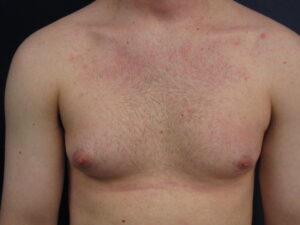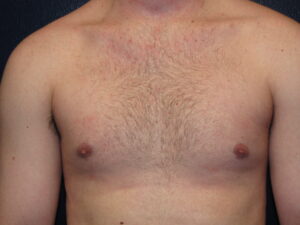
Although enlarged breasts in men is a very common occurrence, it is also quite embarrassing for many and for understandable reasons. Technically and politely, this condition is known as gynecomastia which is derived from Latin, meaning “woman breasts”. It also is colloquially referred to as man-boobs, moobs and even bitch tits.
Especially if you are a young guy, having your buddies commenting on your “bitch tits” is likely something that you would rather not hear or have to deal with.
And if it is your girlfriend or significant other making such comments, that’s even worse!
Talk about impacting your self-esteem… and more.
To try to conceal their chest, many men will wear either layered shirts or loose clothes with an underlying compressive shirt.
Even in 110 degree weather!
Many will avoid swimming and other activities where their chest may be exposed. Social interactions, dating and intimacy are often affected as well.
This is not an ideal situation.
Causes of Gynecomastia
Gynecomastia occurs very commonly during puberty due to the high hormonal levels and hormonal ratios during this period of time. This generally completely resolves by the end of puberty though in some men it does persist. It also commonly develops later on in life in many men due to hormonal issues, particularly an imbalance between estrogen and declining testosterone levels.
There are many other causes of enlarged male breasts. Some of these include obesity, anabolic steroid usage, numerous medications (such as Finasteride, amphetamines and spironolactone), marijuana, genetic disorders and chronic diseases such as those involving the liver (cirrhosis).
Should You Address Your Gynecomastia?
Should you pursue treatment of your gynecomastia?
The answer to this is that it is a personal decision that you need to make based on the effects that its presence has on your life – mental, emotional and physical.
Regardless what your decision is, it may be prudent to determine if there is an underlying medical cause for the development of the breast growth and then address it accordingly. For example, if it is determined that gynecomastia is related to a certain medication, that medication can be discontinued in order to remove the underlying cause of the breast growth. In situations involving a hormonal imbalance, this can be treated to prevent any further growth. However, it won’t undo the breast enlargement already present.
Treatment of Gynecomastia
The specific underlying tissue type(s) responsible for the male breast enlargement as well as the degree of enlargement will largely determine that treatment type.
Non-Surgical Treatment of Gynecomastia
When the underlying cause of the gynecomastia is solely due to fat and not glandular (breast) tissue and one’s weight appears to be the precipitating factor, weight loss may lead to the reduction of breast size. Rarely does it result in complete resolution of the gynecomastia.
Surgical Treatment of Gynecomastia
The definitive treatment of enlarged male breasts is through surgery. The tissue type causing the gynecomastia as well as the severity of the enlargement and plastic surgeon preference will influence the surgical approach employed.
- If the gynecomastia is due to fat and not breast tissue, the liposuction can be employed. This typically involves two or three very small incisions of a few millimeters each through which the fat is suctioned out.
- When breast tissue alone is the causal factor of the male breast enlargement then direct excision of the tissue is done. This is usually accomplished through an incision at the border of the lower half of the areola.
- Gynecomastia that is due to both fat and glandular tissue can be addressed by a combination of liposuction and direct excision of the tissue.
- In situations where the breasts are either massively enlarged or there is a substantial excess or laxity of skin, a far more extensive procedure would need to be performed. This would be the male version of a breast reduction.

Gynecomastia before surgical treatment

After treatment with liposuction and excision of breast tissue
In order to determine how best to treat of your gynecomastia, it is recommended that you seek a consultation with a reputable plastic surgeon who is board certified by the American Board of Plastic Surgery and who has extensive experience in the treatment of gynecomastia. By doing so, this will help maximize the likelihood of obtaining the results that you are seeking.
Scheduling Your Gynecomastia Consultation with Dr. Turkeltaub
For more information on gynecomastia or to schedule your complimentary consultation with Dr. Steven Turkeltaub, you can either call the Arizona Center for Aesthetic Plastic Surgery at (480) 451-3000 or contact us by email.
Steven H. Turkeltaub, M.D. P.C.
Scottsdale and Phoenix, Arizona
